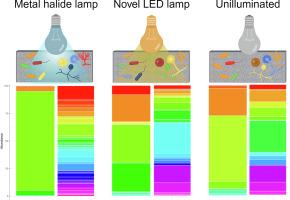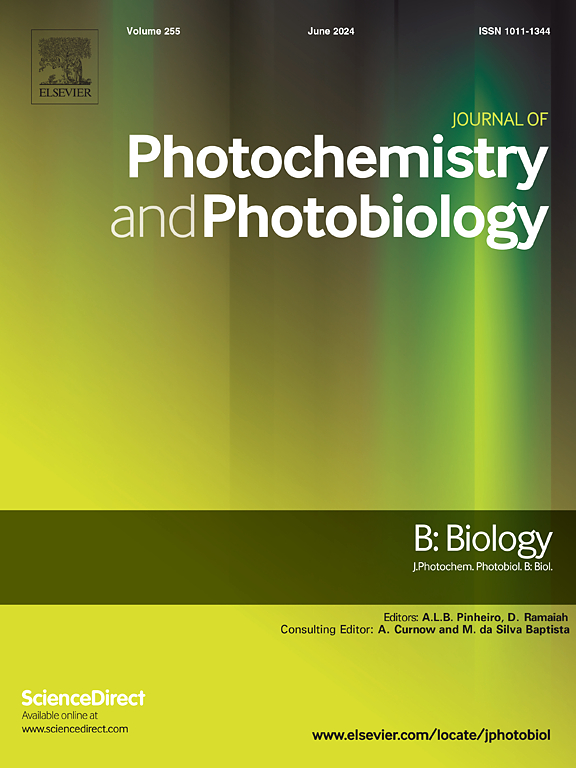通过 MinION 测序鉴定花岗岩外墙装饰性照明引起的微生物组变化。
IF 3.9
2区 生物学
Q2 BIOCHEMISTRY & MOLECULAR BIOLOGY
Journal of photochemistry and photobiology. B, Biology
Pub Date : 2024-11-12
DOI:10.1016/j.jphotobiol.2024.113065
引用次数: 0
摘要
夜间室外照明与自然阳光相结合,可影响石材外墙生长的可见光营养定居者(主要是藻类);但对微生物组(肉眼不可见)的影响尚不清楚。石材微生物(如细菌、硅藻、真菌、病毒和古细菌)的存在会进一步推动生物定殖,这可能会加剧基质的生物劣化。因此,考虑微生物群对保护建筑遗产非常重要。在为期一年的室外试点研究中,我们评估了以下几种照明方式对花岗岩灰岩上微生物群的相对丰度和多样性的影响:无照明;使用金属卤化物灯(目前用于古迹照明的传统照明系统);使用新型 LED 灯(一种具有生物静电效应的环保型原型灯,可阻止光养菌的生物定殖,目前正在试用中)。为了对这两种群落特征描述策略进行补充,还利用牛津纳米孔测序技术(MinION)对细菌和真菌进行了微生物组可培养部分和全基因组测序。此外,还通过平板试验研究了分离菌株在碳酸钙沉淀/溶解和铁氧化/还原方面可能存在的生物劣化特征。此外,还测定了α和β多样性指数,以及生物杀灭剂和抗生素抗性基因的丰度。依赖培养的微生物学分析无法正确显示群落组成的变化,而 MinION 等元基因组学方法更适合显示群落组成的变化。因此,MinION 分析确定了观赏照明引起的花岗岩微生物群的变化。新型 LED 灯对光养菌的生物静电效应增加了细菌和真菌的多样性。在这种情况下,微生物群与未照明样品中的微生物群更为相似。在使用金属卤化物灯照明的样本中,细菌占优势,真菌的存在则微乎其微。本文章由计算机程序翻译,如有差异,请以英文原文为准。

Microbiome shifts elicited by ornamental lighting of granite facades identified by MinION sequencing
Night-time outdoor illumination in combination with natural sunlight can influence the visible phototrophic colonizers (mainly algae) growing on stone facades; however, the effects on the microbiome (invisible to the naked eye) are not clear. The presence of stone-dwelling microbes, such as bacteria, diatoms, fungi, viruses and archaea, drives further biological colonization, which may exacerbate the biodeterioration of substrates. Considering the microbiome is therefore important for conservation of the built heritage. The impact of the following types of lighting on the relative abundance and diversity of the microbiome on granite ashlars was evaluated in a year-long outdoor pilot study: no lighting; lighting with a metal halide lamp (a traditional lighting system currently used to illuminate monuments); and lighting with a novel LED lamp (an environmentally sound prototype lamp with a biostatic effect, halting biological colonization by phototrophs, currently under trial). Culturable fractions of microbiome and whole-genome sequencing by metabarcoding with Oxford Nanopore Sequencing (MinION) was conducted for bacteria and fungi in order to complement both community characterization strategies. In addition, the possible biodeteriorative profiles of the isolated strains, relative to calcium carbonate precipitation/solubilisation and iron oxidation/reduction, were investigated by plate assays. Alpha and beta diversity indexes were also determined, along with the abundance of biocide and antibiotic resistance genes. Culture-dependent microbiological analysis failed to properly show changes in community composition, for which metagenomic approaches like MinION are better suited. Thus, MinION analysis identified shifts in the granite microbiome elicited by ornamental lighting. The novel LED lamp with the biostatic effect on phototrophs caused an increase in the diversity of bacteria and fungi. In this case, the microbiome was more similar to that in the unlit samples. In the samples illuminated by the metal halide lamp, dominance of bacteria was favoured and the presence of fungi was negligible.
求助全文
通过发布文献求助,成功后即可免费获取论文全文。
去求助
来源期刊
CiteScore
12.10
自引率
1.90%
发文量
161
审稿时长
37 days
期刊介绍:
The Journal of Photochemistry and Photobiology B: Biology provides a forum for the publication of papers relating to the various aspects of photobiology, as well as a means for communication in this multidisciplinary field.
The scope includes:
- Bioluminescence
- Chronobiology
- DNA repair
- Environmental photobiology
- Nanotechnology in photobiology
- Photocarcinogenesis
- Photochemistry of biomolecules
- Photodynamic therapy
- Photomedicine
- Photomorphogenesis
- Photomovement
- Photoreception
- Photosensitization
- Photosynthesis
- Phototechnology
- Spectroscopy of biological systems
- UV and visible radiation effects and vision.

 求助内容:
求助内容: 应助结果提醒方式:
应助结果提醒方式:


